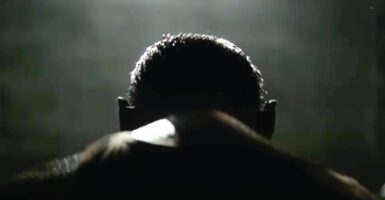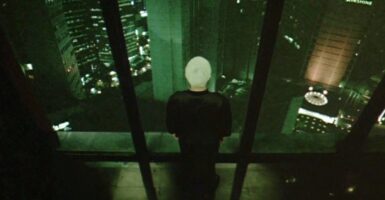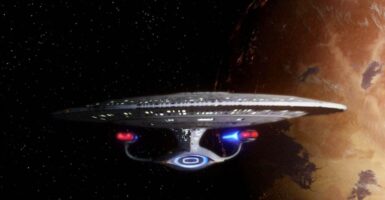Movie Review: Europa Report Makes Space Scary And Beautiful Again
Even the Monolith gives it two thumbs up.
This article is more than 2 years old
 Sad as it is, I know that I’ll never make it up to space during my lifetime. That isn’t to imply my health is failing; more my wallet. But if Europa Report has taught me anything, it’s that I no longer think my penchant for discovery outweighs my complacency for comfort and survival. And it speaks more to the film’s unwillingness to get goofy and melodramatic than my unwillingness to put reward before risk. At least I’d like to think so.
Sad as it is, I know that I’ll never make it up to space during my lifetime. That isn’t to imply my health is failing; more my wallet. But if Europa Report has taught me anything, it’s that I no longer think my penchant for discovery outweighs my complacency for comfort and survival. And it speaks more to the film’s unwillingness to get goofy and melodramatic than my unwillingness to put reward before risk. At least I’d like to think so.
It’s been almost a year and a half since we first saw anything about Ecuadorian director Sebastian Cordero’s mysterious first English-language film, and between that point and actually watching Europa Report just earlier, I allowed the film to become vaguely monolithic in my head. I allowed the blurbs in the trailer to loom large in my memory banks, almost cementing the film as a genre neo-classic before I had even put my eyes on it. Such was my hope. And while I have no idea what kind of movie would have stood up to said hope, Europa Report makes a convincing case to be one of, if not the best science fiction movie of the year thus far, though my enthusiasm will no doubt wane once the latter half of the year’s bigger releases come out. Because it isn’t that a lot happens during Europa Report, but almost everything that does happen means something, even if it’s just a character recording a message to send back to their family on Earth.
Six astronauts with differing specialties launch in the Europa One, setting out for Europa, the ice-covered moon of Jupiter long lauded for its potential either to harbor life or have harbored it in the past. It is the job of a lifetime, traveling millions of miles father than any human being before them, with a chance to change humanity’s understanding of life, the universe, and everything. (If this film was missing anything, it was Douglas Adams quotes.) While these characters necessarily can’t be fleshed out in ways that make them complete individuals, there are no black sheep in the bunch.
Sharlto Copley plays James, the guy who smiles the most. Daniel Wu and Karolina Wydraplays are William and Katya, the compassionate, mission-minded pilots. As Rosa, Anamaria Marinca plays the wide-eyed explorer, while Christian Camargo’s Daniel seems perfectly happy to do his exploring from inside the ship. Finally, Michael Nyqvist is Andrei, the elder engineer and quasi-father figure. These descriptions aren’t entirely fitting for all moments in the film, but there’s not much else to say without spoiling a few things.
So it goes: the mission takes a few detours into panic-driven suspense, and it’s during some of these scenes, successful as they are in appealing to the fear of the nothingness, that the film’s budget constraints are more obvious. Nothing looks cheap or half-conceived, but the “Oh shit!” moments are outnumbered by the “Well, that’s unfortunate,” moments, and it’s due to the limited scope of the film’s mockumentary aesthetic. Ostensibly, the structure is one of the main differences between this and 2010: The Year We Make Contact, the easy comparison. (After a quaint use of “Blue Danube” earlier in the film, I was fully ready for someone to utter, “My God, it’s full of stars.”)
The framework for Europa Report takes place in the “present day,” after the mission was completed, as it were, and the thousands of hours of footage previously thought lost are compiled and edited together to create the central narrative. The lead mission planner, Dr. Unger (Embeth Davidtz), explains the crew’s initial communications blackout and occasionally pops in to recount how people were handling things on Earth while the crew was out of contact. Press coverage of the Europa One’s launch — one of the cooler scenes of its kind in cinema — includes performances from Isaiah Whitlock Jr. and Dan Fogler as fellow science-y folks. (Admittedly, I could not take anything Fogler said seriously.)
My main problem with the film is the odd way it jumps around the time frame. It’s very early on that you realize someone has died, even though they don’t actually die until much later in the film, and then it jumps forward in time again. Yes, there are constant time-stamps alerting viewers to when things are going on, but the back-and-forth completely took me away from thinking of this as documentary evidence. And I know it isn’t, but it’s obvious Cordero intends for viewers to take this viewpoint.
But it does feel like genuine evidence throughout most of the film, and there’s an exhilaration felt that no mere found-footage movie could ever hope to elicit. (Perhaps the first monster shot in Cloverfield matches up, but certainly not the rest of Matt Reeves’ film.) When the crew saw unexpected things, I was just as shocked as they were. When crises broke out, I felt as if my life was also hinging on disaster. And what could possibly be more intriguing than exploring something that no human has ever seen before, and assumedly won’t be in any hurry to get back to? Perhaps comparable only to the ocean-conquering explorers from centuries past, the crew of Europa One travel through completely unpredictable areas, only to find their final destination is far more complicated than they ever could have imagined. And not a single wide shot is needed.
One of Europa Report‘s unspoken characters is composer Bear McCreary’s subtle but effective score, which also defies any documentary predispositions, but is a welcome presence throughout. Viewers’ emotions aren’t guided so much as they are justified.
This is the rare film where I wish a sequel was already in the works, knowing full well how utterly awful an idea that would be, and that I would complain endlessly would it actually happen. But when the credits rolled, I wasn’t ready to leave this universe, and I would do almost anything to go back into it. Except, you know, risk my life or something.












